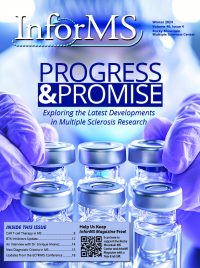
A new class of treatment approaches for MS being studied are Bruton’s Tyrosine Kinase (BTK) inhibitors, or BTKi. Designed as once-daily oral enzyme inhibitors, BTK inhibitors target specific immune cells involved in MS to reduce inflammation, and recent Phase 3 trials have brought mixed but some encouraging results for MS patients.
How BTK Inhibitors Work in MS
BTK inhibitors work by reducing the pro-inflammatory activity of immune cells called B lymphocytes and microglia. Microglia, which reside in the brain and spinal cord, are thought to play a large role in progressive MS, making BTKi particularly interesting for this form of the disease. This class of medications includes several drugs currently in Phase 3 trials for both relapsing and progressive MS.
Key Clinical Trial Findings for BTK Inhibitors: Evobrutinib and Tolebrutinib
The first results for BTKi in relapsing MS came out in December 2023, and showed that the drug Evobrutinib was no better than Teriflunomide (Aubagio) in reducing the annualized relapse rate or disease progression in relapsing MS.
One of the other BTK inhibitors being studied is Tolebrutinib. In the Fall of 2024, Sanofi shared results of three Phase 3 studies for Tolebrutinib and the findings were presented at the European Committee on Treatment and Research in Multiple Sclerosis (ECTRIMS).
Learn more about BTK Inhibitors in Dr. Enrique Alvarez’s recent Education Summit presentation. (YouTube)
Tolebrutinib did not reach the primary endpoint of reducing relapses significantly more than Teriflunomide (Aubagio) in the two GEMINI studies among people with relapsing forms of MS. Tolebrutinib met the primary endpoint of delaying time to onset of confirmed disability progression in the HERCULES study among people with non-relapsing secondary progressive multiple sclerosis. Summaries of these studies are below.
The Phase 3 GEMINI 1 and 2 trials evaluated the efficacy and safety of Tolebrutinib versus Teriflunomide in 1,873 patients with relapsing multiple sclerosis (MS). Key findings included:
- Annualized Relapse Rate: There were no significant differences between Tolebrutinib and Teriflunomide, with low relapse rates in both groups.
- Disability Progression: Tolebrutinib showed a 29% reduction in 6-month Confirmed Disability Worsening (CDW) and a 27% reduction in 3-month CDW, indicating a benefit in delaying disability progression. A non-significant 22% improvement in 6-month Confirmed Disability Improvement (CDI) was also observed with Tolebrutinib.
- MRI Brain Lesions: Tolebrutinib was associated with almost twice as many enhancing lesions and a slight, nonsignificant increase in new/enlarging T2 lesions compared to Teriflunomide.
- Brain Volume Loss: Mixed results were seen, with possibly less brain volume loss with Tolebrutinib in GEMINI 1 but not in GEMINI 2.
- Safety: Adverse events were similar across groups, though Tolebrutinib had more severe liver issues, and Teriflunomide showed a higher incidence of hair loss (15.5% vs 7.8%).
Tolebrutinib offered benefits for patients with relapsing MS in slowing disability progression but showed significant limitations in relapse rate reduction, a significantly concerning impact on increased MRI lesions, and safety concerns around liver toxicity.
Tolebrutinib in Non-Relapsing Secondary Progressive MS: Phase 3 HERCULES Trial Results
The Phase 3 HERCULES trial assessed the efficacy and safety of Tolebrutinib versus placebo in 1,131 patients with nonrelapsing secondary progressive MS. The trial focused on disability progression rather than relapse rates, which are lower in this population. Key findings included:
- Disability Progression: Tolebrutinib reduced disability progression, with a 31% reduction in 6-month Confirmed Disability Worsening (CDW) and 24% in 3-month CDW compared to placebo.
- Disability Improvement: Tolebrutinib demonstrated an 88% improvement in 6-month Confirmed Disability Improvement (CDI), suggesting benefits in functional gains.
- MRI Lesions: Tolebrutinib resulted in 48% fewer new or enlarging T2 lesions than placebo, though there was no significant impact on brain volume loss.
- Safety: While overall adverse events were comparable, Tolebrutinib showed a higher incidence of upper respiratory infections and some severe liver issues, including one reported death.
Tolebrutinib showed promise in slowing disability progression and reducing new MRI lesions in non-relapsing secondary progressive MS. However, safety concerns, particularly around liver health, warrant further investigation.
The Road Ahead for BTK Inhibitors
Tolebrutinib demonstrated promise in reducing disability progression for MS patients, particularly in secondary progressive MS, where treatment options are limited. While not highly effective in relapse reduction or MRI lesion control, Tolebrutinib may serve as a valuable addition to MS treatment by slowing disability accumulation. Liver health safety concerns certainly necessitate further study. Additional BTK inhibitors currently being studied for efficacy and safety include Fenebrutinib, Remibrutinib, and BIIB09.







